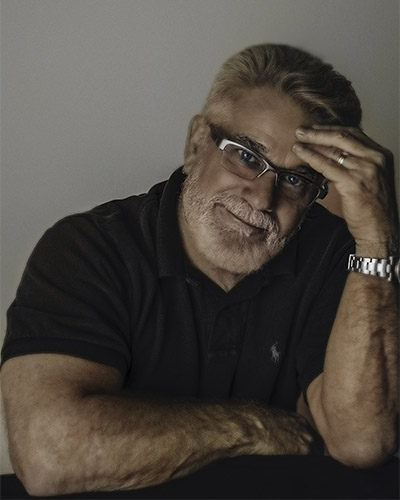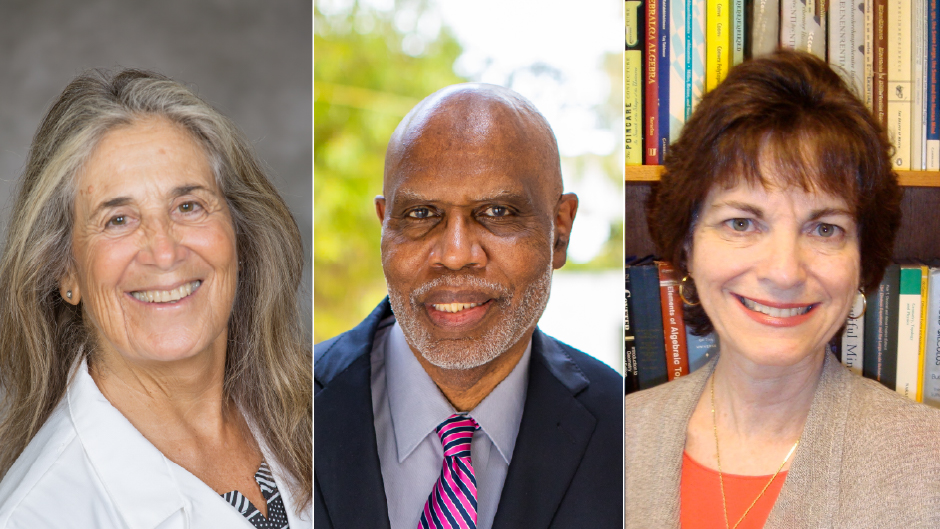Each year the Faculty Senate recognizes three members of the faculty community who represent exemplary teaching, service, and scholarly work. Nominated and selected by their peers based on significant contributions to the University of Miami, the award recipients are honored during the annual ceremony, which is scheduled for Monday, April 12, at 5 p.m.
Among the award recipients—including the Outstanding Teaching Award, the James W. McLamore Outstanding Service Award, and the Distinguished Faculty Scholar Award that are being presented to Meryl I. Cohen, Marvin P. Dawkins, and Michelle Wachs Galloway, respectively—the senate also will recognize J. Tomás Lopez, professor of art in the College of Arts and Sciences, for his long-term service for the faculty through the Faculty Senate.

Since arriving at the University of Miami in 1994, Lopez has served in various capacities in the senate. Over the course of nine years as a senate member, he served on the General Welfare Committee, Athletics Committee, and the Tenure Review Board. Throughout his career, he was also involved in the Provost's Academic Personnel Board, the presidential search consultative committee and a number of other committees within the College of Arts and Sciences.
A former chair of the Department of Art and Art History, he is a visual artist known nationally and internationally for his large-scale digital prints ranging from underwater photographs of the nude figure to politically charged iconic flags. His work has been showcased in more than 350 group exhibitions and 35 solo exhibitions and is included in numerous publications and permanent collections at renowned institutions.
Learn more about this year’s recipients and their impact on the University community.
Passion meets purpose in the classroom.
A pioneer in the field that she now teaches, Meryl I. Cohen, associate professor of clinical in the Department of Physical Therapy at the Miller School of Medicine, was the first physical therapist to become board-certified in any physical therapy specialty in 1985. Throughout her career, she has authored book chapters and textbooks and participated in countless Institutional Review Board-approved research projects, while contributing to evidence-based research that has helped shape her profession.
Cohen’s interest in mobility began in secondary school. And upon graduating with a degree in physical therapy in 1972, she jumped back into school to learn about cardiac and respiratory parameters that indicated safe mobility treatment for high-risk patients with heart disease—an area that was not well-known at the time. “My advanced education afforded me opportunities to engage with other clinicians who had similar clinical practice concerns, and I found myself conducting workshops and seminars not only in the United States, but around the globe, ultimately leading me to focus on classroom teaching in academia,” said Cohen.
In 2000, Cohen began teaching at the University in the Miller School of Medicine’s physical therapy department, joining as a core faculty member in 2006. She has since developed the cardiopulmonary physical therapy course as well as the critical care Intensive Care Unit (ICU) elective and the first cardiopulmonary residency program in Florida, serving as both instructor and program director. Additionally, she has given numerous lectures on cardiopulmonary physical therapy for all six of the University’s physical therapy residency programs, including pediatrics, geriatrics, orthopedics, sports, cardiopulmonary, and neurology.
“Even though she has been teaching this course for years, she is constantly evolving and recreating her lectures and labs to be even better than the year before,” said Sabine Gempel, board-certified cardiovascular and pulmonary specialist in the Department of Physical Therapy at the Miller School of Medicine. Gempel was Cohen’s student in 2012, mentee at the University of Miami Hospital (UMH) since 2013, and teaching assistant in her cardiopulmonary physical therapy course since 2014. “She is always coming up with innovative new ideas using simulation technology and even collaborating with the University’s School of Nursing and Health Studies to recreate the ICU environment.”
Among the awards throughout her career, Cohen has been recognized as the Teacher of the Year by her students a total of seven times, including 2020—a year that brought many new challenges for teaching and learning in the wake of the COVID-19 pandemic. Her colleagues sought her out as a resource to learn how to effectively use Blackboard, Zoom, and live-streaming classroom technology to recreate their courses for in-person and virtual classes.
“Not only is she an excellent, passionate teacher, but she is a truly caring person who forms a connection with her students,” pointed out Gempel. “It is not unusual for our students to reach out to Dr. Cohen for mentoring while they are away on their clinical internships, or for our graduates to continue to reach out to her for years to come.” Outside the classroom, Cohen serves as a faculty adviser; the leader of the Cardiopulmonary Student Interest Group; the principal investigator for student-involved research projects; and a mentor for students, graduates, and physical therapy staff at UMH. “When my graduates relay life-saving stories occurring in their practice, or when they reach out, as they have been, as they work with critically ill and recovering patients with COVID-19, the meaning of what I am doing is irrefutable and motivating beyond my expectations,” said Cohen.
Driving the needle on inclusion and excellence.
Since arriving at the University of Miami in 1988, Marvin P. Dawkins, professor of sociology in the College of Arts and Sciences, has made a long-lasting impact on the University community in the classroom, on faculty matters, and in the athletics space. Through various roles, which include director of the Africana Studies program and director of graduate studies in sociology, he has had opportunities to mentor students from myriad disciplines, working with underrepresented minority students and championing inclusion.
Dawkins was inspired by Dr. Martin Luther King Jr., who attended a historically Black college, had majored in sociology, and was assassinated in 1968 during Dawkins’ sophomore year at Edward Waters College (a historically Black college). “When I found out that Dr. King had majored in sociology, I switched my major from biology to sociology, which I thought would lead me into social activism,” said Dawkins. “Instead, sociology led me to a career as a social scientist studying race relations with a focus on racial and other social inequities and injustices in such areas as education and sport.”
Among Dawkins’ extensive career of service for more than three decades at the University, his role as faculty athletics representative to the Atlantic Coast Conference (ACC) and the National Collegiate Athletic Association (NCAA) stands out. Initially appointed in 2012, he is responsible for representing University academics to the 14 partner institutions in the ACC, certifying NCAA eligibility of more than 400 student-athletes, certifying coaches on NCAA-mandated rules, setting the agenda for strategic priorities, and ensuring academic integrity for student-athletes.
“As a faculty member and senator, Marvin exemplifies the values and priorities of the University community outside our campus and beyond our city,” said Leonidas Bachas, dean of the College of Arts and Sciences. “His service in this capacity is deeply informed by his intellectual and disciplinary background, demonstrating that there is no reason to build a dichotomy between brain and body, between athlete and student, between in-class and on-field education.”
The author of three monographs and more than 70 peer-reviewed articles, Dawkins is currently working on a book-length study on African Americans and golf.
Shaping a field of study.
A world leader in the field of combinatorics, Michelle Wachs Galloway, professor of mathematics in the College of Arts and Sciences, has spent her career specializing in algebraic combinatorics and studying the topology of combinatorial simplicial complexes. Combinatorics is the science of counting, arranging, and analyzing concrete discrete configurations, which can arise in various fields of mathematics, computer science, physics, biology, and engineering. DNA sequences, phylogenetic trees, and communications networks are all examples of discrete configurations. Her love of mathematics began at an early age, long before having any idea of what being a mathematician entailed. Wachs Galloway, a child of immigrants, grew up in New York City and earned her undergraduate degree at the City College of the City University of New York.
“The beach was my other passion as a student,” she explained. “I dreamt of going to California and so I did for graduate school. University of California San Diego had an excellent Math Department and my thesis adviser, Adriano Garsia, loved to hold court right on the beach with his graduate students and visitors.”
After obtaining a doctorate in mathematics at UC San Diego, Wachs Galloway joined the University of Miami faculty in 1977 at age 24. Throughout her career, she has served in various visiting positions at top mathematical institutes, including the Newton Institute at Cambridge University, the Mathematical Sciences Research Institute in Berkeley, and the Mittag-Leffler Institute in Djursholm, Sweden. Most notably, she was invited in 2004 to be a graduate school lecturer in the Geometric Combinatorics program at the Institute for Advanced Study/Park City Math Institute Graduate Summer School and has given lectures at some of the most prestigious academic institutions and research conferences around the world.
Working with preeminent Swedish mathematician Anders Björner, she developed the theory of poset shellability and other tools for studying the topology of simplicial complexes. Additionally, her work with collaborator John Shareshian of Washington University on the topology of simplicial complexes led to further work on Eulerian polynomials and chromatic quasisymmetric functions.
“One great thing about doing research in math is that you can do math anywhere—on an airplane, on the beach, in the shower,” said Wachs Galloway. “But, that can also be a bad thing because it is often hard to turn it off. I have been to concerts and plays that were ruined for me since I couldn’t stop thinking about a math problem that I was stuck on.” She shares the same passion and enthusiasm for her work as her husband, Gregory J. Galloway, professor of mathematics at the University. “Since we are in different fields of mathematics, we don’t collaborate on research,” she explained.
In honor of her contributions to the field of mathematics, Wachs Galloway was named to the inaugural class of Fellows of the American Mathematical Society and, over the years, has served in various capacities in the organization. In 2013, she was awarded a prestigious and highly competitive Simons Fellowship, which she received the same year as her husband. As fellows, the two spent time among leading figures in their fields conducting intensive research at the University of California at Berkeley and the University of Vienna.
“Our jobs have afforded us the opportunity to spend time in cities all over the world in connection with visiting math departments and math institutes, including Stockholm, Vienna, Cambridge, Strasbourg, Beijing, Rio De Janeiro, Jerusalem, Pisa, Berkeley, and Park City,” she noted. Their son—who is now 30—attended elementary schools and high school in Stockholm and Cambridge during their sabbaticals.
In 2006, Wachs Galloway became an inaugural recipient of the College of Arts and Science’s Cooper Fellowship, and in 2013, she was a recipient of the Provost's Award for Scholarly Activity. During the past 40 years, she has received continuous research support by the National Science Foundation as principal investigator for research grants in combinatorics; and as a result, she was selected in 2016 as an inaugural recipient of the newly created Provost’s Funding Award, which recognizes productivity in research.
“Michelle's scholarly work has been extremely impressive for her entire career and received extensive recognition from the Mathematics community,” said Leonidas Bachas, dean of the College of Arts and Sciences.
During the awards ceremony on April 12, Wachs Galloway will give a presentation on “The Art of Counting: Eulerian Numbers,” with the goal of providing a glimpse of some of her research with Shareshian, which has led to connections with areas outside of combinatorics.
Visit fs.miami.edu to learn more about the senate, its representatives, and meeting information.

